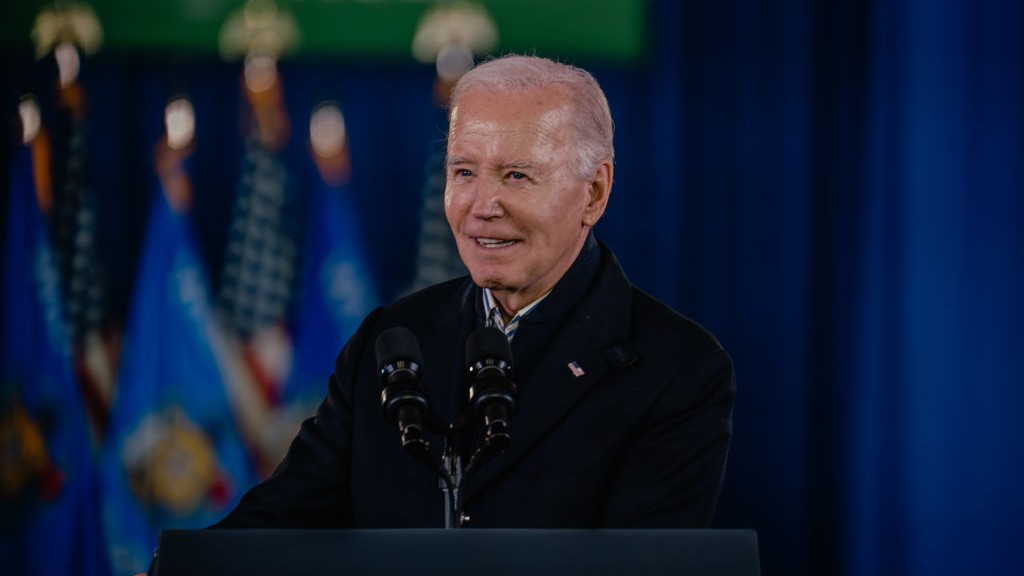How Biden's 2024 campaign will revolve around his economic agenda
The president has consistently battled low approval ratings around his handling of the economy


A free daily email with the biggest news stories of the day – and the best features from TheWeek.com
You are now subscribed
Your newsletter sign-up was successful
As the race for the White House draws ever closer, President Joe Biden will likely look to tout his legislative agenda as fuel to propel him to a second term, but there is one area of uncertainty looming over voters: the economy.
The Biden administration has been working to stabilize the economy following a period of rampant inflation, and the efforts do appear to be working; even The Wall Street Journal — with its often conservative editorial board— noted that "stock prices are booming, the job market is strong and inflation is falling in the U.S." Despite this, Biden does not seem to be gaining political points — while polls show that consumer confidence is growing, overall polling on Biden's handling of the economy remains low.
As a result, the Biden administration will likely make the economy one of the key messages — if not the key message — of the president's reelection bid this year. How will the president address his economic agenda and track record leading up to the election?
The Week
Escape your echo chamber. Get the facts behind the news, plus analysis from multiple perspectives.

Sign up for The Week's Free Newsletters
From our morning news briefing to a weekly Good News Newsletter, get the best of The Week delivered directly to your inbox.
From our morning news briefing to a weekly Good News Newsletter, get the best of The Week delivered directly to your inbox.
There are 'a lot of politics at play'
The White House has recently been extolling key economic indicators such as slowing inflation, high job growth and low unemployment levels, all of which are good signs heading into 2024. But that "really isn't filtering down to how Americans feel about the economy," NPR senior political editor Domenico Montanaro said on "Morning Edition."
Most people "just don't think people look at this in a macroeconomics kind of way," Montanaro opined. "When people see big signs with gas prices higher than they'd like, and when they see that their bill at the checkout counter in the grocery store is $20, $30 higher than they'd paid, you know, say, a year or two ago, then that stings." But it isn't just pricing, Montanaro added. "There's a lot of politics at play here, too ... when a new administration comes in, there's been a sharp reversal in perceptions of the economy by party."
"Voters are unhappy about the state of the economy, even though, by most measures, it’s doing great," economic opinion columnist Peter Coy wrote for The New York Times. This is because there seems to be a "disconnect between good numbers and bad vibes," economist Paul Krugman added for the Times. Beyond political partisanship, it is a longstanding fact that "while economists tend to focus on relatively recent inflation, people tend to compare prices with what they were some time in the past," Krugman said.
"Perceptions of inflation are filtered through politics," Coy concluded. "Food and gasoline are more expensive for Trump supporters than Biden supporters, if you believe what people tell pollsters. That’s not going to change between now and November."
A free daily email with the biggest news stories of the day – and the best features from TheWeek.com
A fundamental reframing
A recent study from the progressive think tank Way to Win concluded that Democrats should "reframe the discussion to tangible, personal economic concerns." The think tank noted that voters "are moved by what impacts them, not economic abstractions," and many Americans are still feeling the negative effects of price gouging.
Democrats "cannot win the debate over the economy without fundamentally reframing the terms of the choice they are offering voters," editor Ronald Brownstein wrote for The Atlantic, which published Way to Win's study. While the White House has spent months trying to win over voters with the president's "Bidenomics" agenda, the study argues that it's counterproductive "to try to convince voters that inflation is abating or that the economy is improving while so many are struggling to make ends meet," Brownstein noted.
Veteran political pollster Stanley Greenberg agreed, saying that "reciting accomplishments doesn't move [voters]" in a recent memo obtained by the Los Angeles Times. "Democrats talking about this strong economy and things moving in the right direction [sound like they] are talking about a different country." Rather, Biden and his administration officials should "talk only about high prices, what we have done and how we are going to help going forward, and try to win the cost-of-living argument," Greenberg opined.
Greenberg, who helped former President Bill Clinton's campaigns in the 1990s, added that the cost of living should be first on Biden's agenda in 2024. "It’s the only issue for Gen Z, millennials, unmarried women and white working-class voters under 50," Greenberg concluded.
Justin Klawans has worked as a staff writer at The Week since 2022. He began his career covering local news before joining Newsweek as a breaking news reporter, where he wrote about politics, national and global affairs, business, crime, sports, film, television and other news. Justin has also freelanced for outlets including Collider and United Press International.
-
 Samurai: a ‘blockbuster’ display of Japanese heritage
Samurai: a ‘blockbuster’ display of Japanese heritageThe Week Recommends British Museum show offers a ‘scintillating journey’ through ‘a world of gore, power and artistic beauty’
-
 BMW iX3: a ‘revolution’ for the German car brand
BMW iX3: a ‘revolution’ for the German car brandThe Week Recommends The electric SUV promises a ‘great balance between ride comfort and driving fun’
-
 Munich Security Conference: a showdown between Europe and Trump?
Munich Security Conference: a showdown between Europe and Trump?Today’s Big Question Report suggests European leaders believe they can no longer rely on the US for military support – but decoupling is easier said than done
-
 Big-time money squabbles: the conflict over California’s proposed billionaire tax
Big-time money squabbles: the conflict over California’s proposed billionaire taxTalking Points Californians worth more than $1.1 billion would pay a one-time 5% tax
-
 The ‘mad king’: has Trump finally lost it?
The ‘mad king’: has Trump finally lost it?Talking Point Rambling speeches, wind turbine obsession, and an ‘unhinged’ letter to Norway’s prime minister have caused concern whether the rest of his term is ‘sustainable’
-
 Did Alex Pretti’s killing open a GOP rift on guns?
Did Alex Pretti’s killing open a GOP rift on guns?Talking Points Second Amendment groups push back on the White House narrative
-
 ‘Implementing strengthened provisions help advance aviation safety’
‘Implementing strengthened provisions help advance aviation safety’Instant Opinion Opinion, comment and editorials of the day
-
 Washington grapples with ICE’s growing footprint — and future
Washington grapples with ICE’s growing footprint — and futureTALKING POINTS The deadly provocations of federal officers in Minnesota have put ICE back in the national spotlight
-
 Trump’s Greenland ambitions push NATO to the edge
Trump’s Greenland ambitions push NATO to the edgeTalking Points The military alliance is facing its worst-ever crisis
-
 ‘The surest way to shorten our lives even more is to scare us about sleep’
‘The surest way to shorten our lives even more is to scare us about sleep’Instant Opinion Opinion, comment and editorials of the day
-
 Why is Trump threatening defense firms?
Why is Trump threatening defense firms?Talking Points CEO pay and stock buybacks will be restricted
